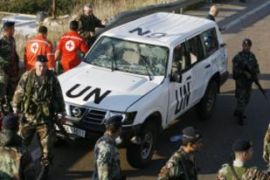UN troops wounded in Lebanon blast
Irish soldiers hurt on same day Lebanese rockets strike Israeli town of Shlomi.

Doctors at the hospital in Sidon identified the soldiers as Irish.
Tuesday’s blast marked the third such incident against the UN peacekeepers since the force was boosted to more than 13,000 soldiers after the 2006 war between Israel and Lebanese Shia group Hezbollah.
Sealed off
Zeina Khodr, Al Jazeera’s correspondent close to the blast site in Rumeilli, south Lebanon, said: “The reports we have say that a bomb was placed on the side of the road and detonated by remote control.
“We cannot confirm that. But we do know that the Lebanese army has sealed off the area and investigations have begun.”
Although the last Irish unit serving with the UN force was stood down in October, there are still a number of Irish staff officers in Lebanon, a UN official said.
In the deadliest attack, six members of the Spanish contingent were killed on June 24 last year when a booby-trapped car exploded as their patrol vehicle passed by.
On July 16, a vehicle belonging to the Tanzanian contingent was damaged in a bomb blast in southern Lebanon, but there were no casualties.
The latest incident comes amid high tension in Lebanon, which has been without a president since November 24, when Emile Lahoud stepped down with no elected successor.
It also comes amid an ominous threat this week by the leader of an al-Qaeda-inspired militia which fought a 15-week battle with the Lebanese army last year.
Lebanese rockets
Meanwhile in a pre-dawn attack on Tuesday, Lebanese rockets struck the northern Israeli town of Shlomi a day before a scheduled regional visit by George Bush, the US president.
No one has taken responsibility for the attack, the second such incident since the end of the 2006 war between Israel and Hezbollah.
There was little damage reported and no injuries.
Ehud Barak, the Israeli defence minister, called it “an unusual incident” and told local radio: “We don’t intend to allow the status quo in the region to change.
“We will study what happened and will think and decide. What needs to be done, we will do.”